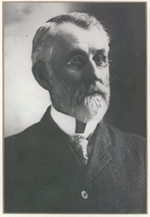
Moses Milton Beck, editor of the Holton Recorder. Anthony would write to his friend several times expressing his earnest desire to win the Republican nomination for Governor, in what he believed was his last opportunity. (Courtesy, Kansas Press Association)
“I think I shall take my chances. I do not propose to make and aggressive canvas, and will not fight any candidate. They are all good men…I would consider it a great honor.” (Gaylord Herald, reprinted in Leavenworth Times, March 25, 1888) So said D.R. Anthony when asked about his candidacy for the Republican nomination for Governor of Kansas. By early 1888, at the age of 63, Anthony had bowed out of an active role with the Leavenworth Times. Since then, as the Kansas City Journal put it, “he has devoted his attention to his farm and those agricultural pursuits which are so congenial and even necessary to statesmen in Kansas.” He may have been enjoying life as a farmer, but Kansas politics was an arena in which he had already thrived; he had been mayor and postmaster of Leavenworth at various points, run for governor in 1878, and fought countless political battles as boss of the Times. Along the way he made friends and enemies in equal measure. Reactions to his candidacy from Republican newspapers across the state strike a familiar tune. One called him “cold poison”, another declared “No Truer Man Could be Selected.” The Gueda Springs Herald suggested, perhaps with tongue in cheek, that his sister, “the noblest Anthony of them all”, was the best candidate. Perhaps the Lawrence Tribune put it best: “no man in Kansas is better known than Mr. Anthony, and, if he should fail to secure the nomination it will not be because no one ever head of him”
![According to Anthony, Congressman Edmund N. Morrill wrote to him offering to "speak a good word for you for governor, in our district or any where else in the state...I am entirely free from any entangleing [sic] alliances...I will write to my friends...in the district, urging them to support you." With such powerful friends, Anthony was in a good position.](http://blogs.dickinson.edu/hist-bye/files/2015/01/E.N.-Morrill-175x300.jpg)
According to Anthony, Congressman Edmund N. Morrill wrote to him offering to “speak a good word for you for governor, in our district or any where else in the state…I am entirely free from any entangleing [sic] alliances…I will write to my friends…in the district, urging them to support you.” (Anthony to M.M Beck, April 14, 1888) (Image courtesy, Wikipedia)
In studying D.R. Anthony, one of the traits that stands out about him is his ambition, and his willingness to gamble on himself. For better or worse, he never did anything halfway, which makes his public insistence that he would not actively seek the Governorship all the more odd. By 1888 he was known across the state for his combativeness, and his quiet entrance into the race was likely a tactical move to keep from ruffling too many feathers. Anthony wanted to be governor of Kansas very badly, an achievement that would put the exclamation point on his life. With the convention set for July 25th, in Topeka, he would soon have his chance.
Sources
M.M Beck Collection. Letters. Manuscripts. Kansas State Historical Society, Topeka, Kansas
Leavenworth Times, March 25, 1888. www.newspapers.com

